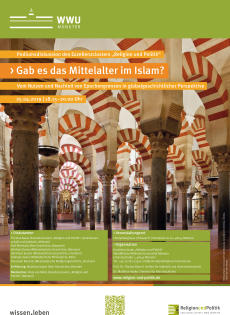Were there any Middle Ages in Islam?
Panel on epochal boundaries in a global historical perspective with scholar of Arabic studies Thomas Bauer

Under the title “Gab es das Mittelalter im Islam?” (Were there any Middle Ages in Islam?), the scholar of Arabic studies Prof. Dr. Thomas Bauer will discuss theses of his publication “Warum es kein islamisches Mittelalter gab” (Why There Were No Islamic Middle Ages) with researchers from history, philosophy and religious studies. The panel discussion on 25 April 2019 will deal with the benefits and disadvantages of epochal boundaries in a global historical perspective. Organisers are the University of Münster’s Cluster of Excellence “Religion and Politics” and Institute of Arabic and Islamic Studies. The introduction will be given by ancient historian Dr. Matthias Haake from the Department of Ancient History, who initiated the event.
The panel discussion will involve: Prof. Dr. Ralf Behrwald from the University of Bayreuth; medieval historians Prof. Dr. Wolfram Drews from the Cluster of Excellence and Prof. Dr. Bernhard Jussen from the Goethe University Frankfurt; Prof. Dr. Kianoosh Rezania, who teaches West Asian religious history at Ruhr Universität Bochum; and Prof. Dr. Andreas Speer, who teaches medieval philosophy at the University of Cologne. Viola van Melis, Head of the Centre for Research Communication of the Cluster of Excellence, will present the meeting.
“Stuck in the Middle Ages, missed the Reformation and Enlightenment”
In his book, the scholar of Islamic studies Prof. Dr. Thomas Bauer questions historical epochal boundaries and widespread stereotypes about Islamic history. “Islam got stuck in the Middle Ages, missed the Renaissance, Reformation and Enlightenment – this is the common diagnosis. But what if there were no Islamic Middle Ages at all?” asks the researcher. He shows by means of examples how antiquity lived on in the Islamic world until the 11th century, thus aiming to disprove the well-established epochal boundaries and the image of a “medieval” Islam in need of reform.
“For centuries, the ancient cities of the Orient were alive with baths, mosques and other large stone buildings, while in Europe these were falling into ruin,” according to Bauer. Doctors continued the medicine of the Roman physician Galen (130–210 AD), and the natural sciences and love poetry were flourishing. “Copper coins, glass, roof tiles, paper: there were many ancient achievements in the everyday life of the Orient that Central Europeans (re-)discovered only at the beginning of the modern era.” The Leibniz and Tractatus laureate Thomas Bauer describes in his study how the ancient culture of al-Andalus survived in an area spanning Spain, North Africa, Syria and Persia and why the 11th century formed a turning point throughout Eurasia – from the Hindu Kush to Western Europe – which was, before long, followed by modern times in the Islamic world. (sca/vvm)

